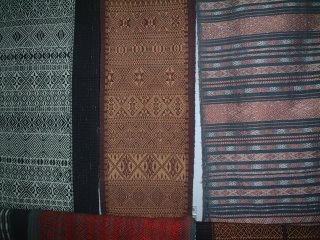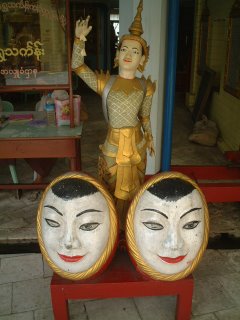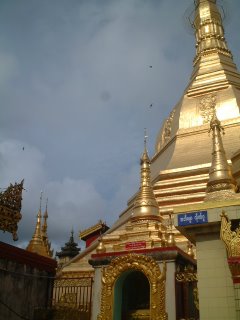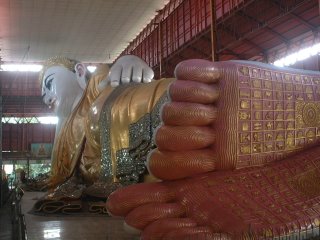









September 26, 2006
Another couple of weeks have glided by here, leaving barely a ripple in their wake. The monsoon rains have returned with a vengeance, although this time bringing occasional thunder, a sure sign according to the Burmese that the monsoon will soon be over. There are still occasional sunny days, but most days are grey again, dampening the spirits.
Just after writing my last entry, I had the misfortune of stepping on a nail while running. It was the classic rusty nail, and it poked right through the sole of my runner, throught the sole of my foot and out the top of my foot. Miraculously, it missed any tendons, arteries, bones, ligaments, nerves or muscles that it could have severed, and after an exceedingly painful tetanus booster, it seems to have healed well, with no infection. I was on a residential street at the time, and the inhabitants of the nearest house ran out when they heard me howling in pain and helped me, pulling the nail out, bathing the cut in lemon juice, then water, then Betadine, and finally loading me into a taxi and sending me home. As always, I was impressed with the helpfulness and generous hospitality of people here. The visit to a local clinic cost 2100 kyat for the doctor (about $1.50) and 3000 kyat for medicines and the tetanus booster (another $2.20). It could have been much worse, and I’m already back to running.
It was good to see my friend Ray as he and his girlfriend Akiko passed through town that weekend. He fired us up to do our own exploring of the hinterland starting next week, and wowed us with his array of magic tricks; he even left us with one to use for ourselves. This weekend we’re on a visa run to Bangkok, with a side trip to Kanchanaburi to see the remarkable tiger temple there. After that, we’ll be off the following Thursday afternoon to Bagan, the huge ruined capital city in central Burma, and then Inle Lake, the beautiful lake nestled in the mountains of Shan State.
I can’t wait. Much as teaching here has been fun, it’s still a job and it still ties us down, preventing us from seeing much of the country. I’ve been reading up on various bits of the country that I really want to visit, and getting quite excited to see new sights. I chatted with a man from Chin State who runs a handicrafts store in the main Bogyoke Market and was once again reminded how much I would like to visit this hard-to-get-to corner of the country, full of medium-sized mountains, head-hunting tribes and ethnic and cultural diversity.
Yesterday, for the first time, I ventured out of the school at lunchtime to eat at a local food stall on the street corner next to the school. The Burmese language teacher and a security guard were there as well, and I settled in for a meal of rice, fish-ball curry, vegetables and a water-spinach soup. It was very reminiscent of the meals I had most days in northern Vietnam, except that it was even cheaper; only 400 kyat ($0.30). I can’t believe that it’s taken me this long to sample the street cuisine here; I’ve allowed myself to be trapped in a strange expatriate bubble of (relatively) expensive restaurants and taxis, rather than my usual street-food-and-public-transport exposure to a country. I haven’t even learned the numbers in Burmese, a sign perhaps of how much basic English is spoken here, but also a sign of how little I’m really trying to get into this country and its culture. Having come to this realization, it’s time to start taking Burmese lessons and learning to decipher the delightfully bubble-like alphabet. On the weekend I purchased an oversized poster of the Burmese consonants (all 33 of them) to hang on my wall for contemplation. Now I need another chart for the 36 different combinations of vowel sound, tone (3 of them), nasalization and glottal stopping, and I’ll be ready for reading.
Joanne and I were discussing the other day why the streets seem less frenetically crowded and miserable than in your average Indian city. We decided that the near-absence of beggars (although I’m starting to notice them more often here and there; the fear of the police, enforcing anti-vagrancy laws, may play a big part here), the lack of people sleeping out on the streets at night and the relative scarcity of children (Burma is said to have one of the lower population growth rates and lower fertility rates in underdeveloped Asia) make it easier to be on the streets here. As well, Buddhism plays its part, as it seems to make for a less in-your-face culture than Hinduism. Although the British administered Burma for 50 years as part of the British Raj, Burma has largely retained its distinctive culture and feel. Despite the number of Indian immigrants to Rangoon, there is little of the atmosphere of India here. Partly that may be due to the government’s coercive Burmicization policy, whereby in order to get any access to telephones, government documents and services, everyone, whether Burmese, Indian, Chinese or tribal minority, has to adopt a Burmese name.
I would like to close with a recurring vignette from my 8th-storey bird’s-eye view of the neighbourhood. I love standing at my classroom window watching the trains run past the school on the main Rangoon-Mandalay line. The freight trains are always loaded down with people, hoboes hitching a lift into town from the countryside for work; sometimes a single 10-car train will have over a hundred non-paying passengers sitting on it. The passenger trains, especially the big ones headed up-country, are another attraction, as they exude the freedom of the road to those of us trapped in the 9-to-5 routine. My favourite, though, are the occasional steam engines chugging by, hauling freight cars. Unlike steam locomotives in most of the world, these are not tourist attractions; these are working train engines chugging by with the distinctive chug-a-chug-a rhythm of The Little Engine Who Could, punctuated by the evocative strains of a steam whistle. The steam locomotives are Burma in microcosm: once the last word in prosperity and state-of-the-art modernity, now an amusing and charming anachronism in which time has barely budged since independence in 1948.
September 28, 2006
Yesterday the monsoon started to retreat, I think. Suddenly the prevailing winds shifted 180 degrees and began to howl. The air suddenly felt drier, and various middle-aged teachers began complaining that their joints were beginning to ache, a sure sign of changing weather (or so I’m told). It’s amazing how definitive a change it seemed to be; although it’s still raining, there’s an air of finality about the monsoon.
Off to Bangkok today for a visa renewal run, a trip to the tiger temple in Kanchanaburi and some general rest and relaxation. I shall post this there.
Happy Reading!
Graydon

0 Comments:
Post a Comment
<< Home